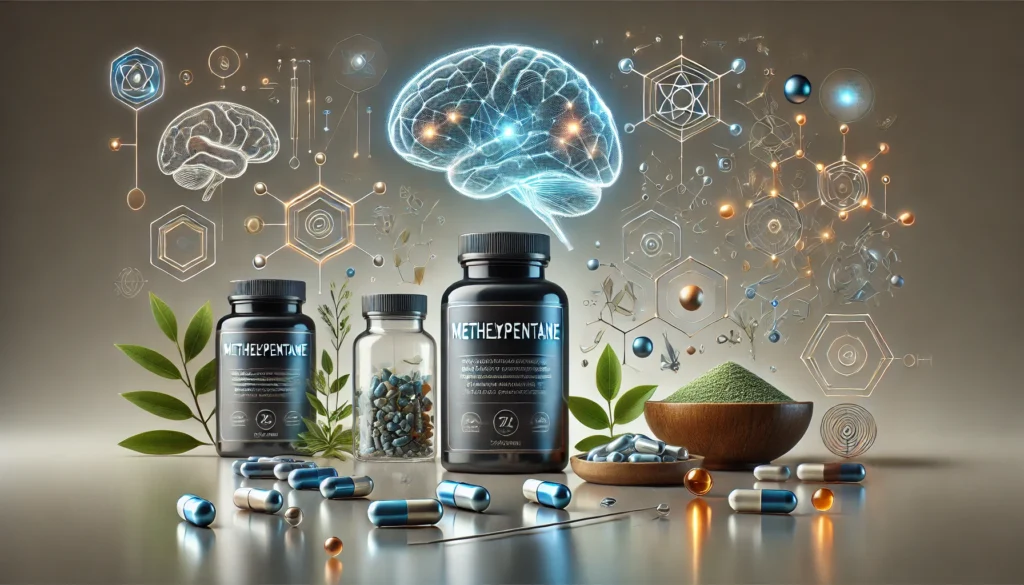Methylpentane, a chemical compound in the alkane family, has garnered attention in recent years for its potential as a nootropic supplement. Its molecular structure and unique properties suggest it may influence various aspects of cognitive function, though much remains to be explored regarding its full spectrum of effects and mechanisms of action. This article provides a comprehensive analysis of methylpentane, examining its sources, chemical structure, physiological mechanisms, potential nootropic benefits, dosing guidelines, possible side effects, and interactions with other drugs or supplements.
You May Also Like:
Sources of Methylpentane
Methylpentane is primarily synthesized in laboratory settings, although it can also be found in trace amounts in some natural sources, such as petroleum products. As an alkane, methylpentane is not an essential nutrient and does not naturally occur in foods, but rather in environmental sources or as a byproduct of hydrocarbon extraction. It is more commonly known for its use as a fuel component or in industrial applications, but methylpentane’s potential as a nootropic has piqued interest in both academic and commercial settings.
In the context of supplementation, methylpentane is typically available in isolated form as a synthetic compound or as part of certain pre-formulated nootropic blends, particularly those designed to enhance mental clarity, focus, and cognitive function. It is important to note that its use as a supplement is still being investigated, and most available products are marketed for specific, targeted cognitive effects rather than general health or wellness.

Chemistry of Methylpentane
Methylpentane is an organic compound with the molecular formula C6H14. It is a member of the alkane family, consisting of six carbon atoms and fourteen hydrogen atoms arranged in a straight-chain or branched configuration. Methylpentane exists in several isomeric forms, with the most common being 2-methylpentane. Its molecular structure is simple yet versatile, making it relatively stable and non-polar. The addition of the methyl group (–CH3) to the pentane chain alters its physical and chemical properties compared to its straight-chain counterpart, n-pentane, resulting in a compound that is slightly more volatile and less dense.
Chemically, methylpentane is not highly reactive, and its primary role in the body is likely related to its ability to interact with the central nervous system in a manner that supports cognitive function. As a relatively straightforward hydrocarbon, its effects are thought to be mediated primarily through its impact on energy metabolism and potentially through modulating neurotransmitter systems.
Physiological Mechanisms of Methylpentane in the Body and Brain
Methylpentane’s impact on the body and brain is largely driven by its influence on metabolic processes and the central nervous system. Although research specifically focused on methylpentane is limited, some of its effects can be inferred from its chemical structure and the known biological activity of similar alkanes and hydrocarbons.
- Energy Production and Metabolism
Methylpentane is believed to affect energy metabolism in the brain. As an alkane, methylpentane can be metabolized in the body, yielding energy through oxidative processes in mitochondria. The brain, which consumes a significant amount of energy in the form of glucose and oxygen, may benefit from the enhanced metabolic activity promoted by methylpentane. Increased energy availability in the form of ATP (adenosine triphosphate) supports cognitive tasks such as memory consolidation, attention, and focus. - Neurotransmitter Modulation
Preliminary studies suggest that methylpentane may modulate the activity of certain neurotransmitters, including dopamine and serotonin. These neurotransmitters are integral to mood regulation, cognitive performance, and focus. By influencing dopamine and serotonin signaling pathways, methylpentane could potentially enhance mood, reduce anxiety, and improve cognitive clarity, though more research is needed to confirm these effects. - Cognitive Performance and Focus
Methylpentane is thought to act as a mild stimulant, which may help improve focus and attention by enhancing brain activity and increasing blood flow to key regions involved in cognition. While the effects of methylpentane on cognition have not been extensively studied, it may provide benefits similar to those observed with other aliphatic compounds that affect the central nervous system. This could include improved mental clarity, sustained attention, and faster processing speed, making methylpentane a potential candidate for nootropic supplementation.
Unlock Brain Health and Mental Resilience with Advanced Bacopa Monnieri—Shop Now on Amazon!

Nootropic Benefits of Methylpentane
The use of methylpentane as a nootropic supplement is still being explored, and much of the existing knowledge is based on its chemical structure, potential interactions with the central nervous system, and preliminary studies of related compounds. However, based on its physiological mechanisms, methylpentane may offer the following cognitive benefits:
- Enhanced Focus and Attention
Like other mild stimulants, methylpentane may improve focus and concentration by stimulating the central nervous system. This could be particularly beneficial for individuals who struggle with mental fatigue, distractions, or prolonged tasks that require sustained attention. By boosting energy metabolism in the brain, methylpentane may help users maintain focus and mental clarity during cognitive tasks. - Mood Elevation and Stress Reduction
Methylpentane’s potential ability to modulate neurotransmitter systems, particularly dopamine and serotonin, suggests that it may have mood-enhancing properties. Dopamine is involved in reward and motivation, while serotonin plays a crucial role in mood regulation and relaxation. By promoting a balance between these neurotransmitters, methylpentane may help alleviate symptoms of anxiety, stress, and mild depression, although further studies are needed to confirm its effects. - Increased Mental Clarity and Cognitive Performance
Preliminary evidence suggests that methylpentane may promote overall cognitive function by enhancing blood flow to the brain and increasing metabolic activity. With better oxygen and nutrient delivery to neurons, the brain may function more efficiently, improving mental clarity and cognitive processing speed. This effect could help individuals facing mental fatigue or cognitive decline associated with aging. - Neuroprotective Effects
As an alkane, methylpentane may also offer some degree of neuroprotection, particularly through its impact on oxidative stress. While research on the neuroprotective effects of methylpentane is scarce, alkanes in general are known to possess antioxidant properties, which could help mitigate cellular damage caused by free radicals. This is of particular importance in preventing cognitive decline and promoting long-term brain health.

Dosage and Supplementation Guidelines
As methylpentane is not commonly used as a standalone nootropic supplement, precise dosing guidelines are not universally established. However, based on its chemical properties and the effects of similar compounds, general recommendations can be made:
- General Nootropic Dosage
For cognitive enhancement and focus, a typical dose of methylpentane is likely to range between 50-200 mg per day. However, given the lack of comprehensive studies on the ideal dosage, individuals should begin with lower doses and gradually increase, monitoring for any side effects. The effects of methylpentane may be cumulative, so consistent, long-term use could potentially provide greater benefits. - Forms of Supplementation
Methylpentane is generally available in capsule or tablet form, but it can also be found in some pre-formulated nootropic blends. As a supplement, methylpentane is often combined with other cognitive-enhancing compounds like caffeine, L-theanine, or racetams to provide synergistic effects on brain function. Individuals should be cautious when combining methylpentane with other stimulants to avoid overstimulation. - Stacking with Other Nootropics
Methylpentane may be effectively combined with other nootropic substances, especially those known to enhance energy, focus, and mood. For example, pairing methylpentane with caffeine could increase alertness and attention. Similarly, combining it with adaptogens like Rhodiola rosea may help counterbalance any potential stress-related side effects.
Side Effects and Safety
Methylpentane, as a synthetic compound, is generally considered safe when used appropriately. However, as with any nootropic or stimulant, potential side effects and safety concerns should be taken into account.
- Mild Stimulant Effects
As methylpentane may act as a stimulant, it could cause side effects such as jitteriness, anxiety, or elevated heart rate, particularly in individuals who are sensitive to stimulants. Those who are prone to anxiety or have a history of heart problems should approach methylpentane with caution. - Gastrointestinal Distress
Some individuals may experience gastrointestinal discomfort, including nausea or upset stomach, when taking methylpentane. These effects are typically mild and can be mitigated by starting with a low dose and taking the supplement with food. - Sleep Disruption
Due to its stimulating effects, methylpentane may interfere with sleep if taken too late in the day. It is advisable to take methylpentane in the morning or early afternoon to avoid potential disruptions to sleep patterns.
Interactions with Other Supplements and Medications
Methylpentane may interact with other substances, particularly those that influence the central nervous system or energy metabolism.
- Caffeine and Other Stimulants
As a mild stimulant, methylpentane may enhance the effects of caffeine or other stimulants. While this could provide a temporary boost in cognitive performance, it may also increase the risk of side effects like anxiety or restlessness if taken in excess. - Antidepressants and Anxiety Medications
Individuals taking medications that affect serotonin and dopamine levels, such as selective serotonin reuptake inhibitors (SSRIs) or dopamine agonists, should consult a healthcare provider before using methylpentane. Combining methylpentane with these medications could potentially lead to an overstimulation of neurotransmitter systems, resulting in side effects such as mood swings or nervousness. - Blood Pressure Medications
If you are taking medication to manage blood pressure, methylpentane may have an additive effect on blood pressure due to its stimulating properties. Individuals with hypertension should consult their doctor before using methylpentane.

Risks for Individuals with Certain Health Conditions
While methylpentane is safe for most individuals, certain health conditions may require extra caution:
- Cardiovascular Disease
As methylpentane may elevate heart rate and blood pressure, individuals with cardiovascular conditions should avoid or carefully monitor their use of methylpentane. - Anxiety Disorders
Due to its stimulant effects, methylpentane could exacerbate symptoms of anxiety or panic disorders. Individuals with these conditions should use methylpentane sparingly and under medical supervision.
Conclusion: Should You Consider Methylpentane as a Nootropic?
Methylpentane presents a potentially promising nootropic for enhancing focus, energy, and cognitive performance. While its effects are not yet fully understood, early indications suggest that it may offer benefits similar to other mild stimulants, particularly in the areas of attention and mental clarity. However, given the lack of extensive research on methylpentane, it is essential to approach its use cautiously and under the guidance of a healthcare professional, especially for individuals with pre-existing health conditions or those taking medications that may interact with the supplement.
In conclusion, methylpentane is an intriguing compound with potential cognitive-enhancing properties. While more research is needed to fully understand its mechanism of action, it may be a useful addition to a nootropic regimen for those seeking improved mental focus and clarity. As always, it is crucial to balance potential benefits with an awareness of possible side effects and interactions, ensuring safe and effective supplementation.

References:
- Methylpentane. Retrieved from: https://www.rxlist.com/supplements/methylpentane.htm
- Neurotransmitter Roles in Synaptic Modulation, Plasticity and Learning in the Dorsal Striatum. Retrieved from: https://pmc.ncbi.nlm.nih.gov/articles/PMC2849868/
- Sleep disorders and problems (insomnia): Learn More – What can you do if you have trouble sleeping? Retrieved from: https://www.ncbi.nlm.nih.gov/books/NBK279320/
Important Note: The information contained in this article is for general informational purposes only, and should not be construed as health or medical advice, nor is it intended to diagnose, prevent, treat, or cure any disease or health condition. Before embarking on any diet, fitness regimen, or program of nutritional supplementation, it is advisable to consult your healthcare professional in order to determine its safety and probable efficacy in terms of your individual state of health.
Regarding Nutritional Supplements Or Other Non-Prescription Health Products: If any nutritional supplements or other non-prescription health products are mentioned in the foregoing article, any claims or statements made about them have not been evaluated by the U.S. Food and Drug Administration, and such nutritional supplements or other health products are not intended to diagnose, treat, cure, or prevent any disease.


